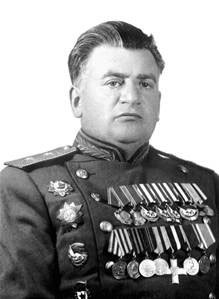Grigorii Plaskov was born in Minsk in 1898. His father worked in a brewery. In 1911, Grigorii stopped attending a Jewish primary religious school and began working as a metal worker at a factory. He took part in the Russian civil war of 1918-1920. In 1925 he graduated from an advanced artillery school and, in 1932, from the Frunze Military Academy in Moscow. During the Soviet-German War, he began with the rank of colonel. Plaskov commanded artillery forces of various armies. From October 1941 to April 1942, he participated in the defense of Moscow and in the subsequent counter-offensive from Moscow westward. During the defensive battles west of Moscow, Plaskov was one of the first artillery commanders to test some new weapons, including the rocket-shell known as Katiusha, During the winter counter-offensive of 1942 Plaskov was promoted to the rank of major-general of artillery. He was a strange general who was well-known in the Red Army, and often reprimanded by the higher command for his "indiscreet actions." There were cases when he personally fired a cannon, one case when he personally led two battalion of soldiers on an infantry attack, and several cases when he took part in skirmishes with the enemy side-by-side with rank-and-file soldiers.
Plaskov was wounded no less than five times during the Soviet-German War (not to mention the three times he was wounded during the civil war). In the spring of 1944, while acting in Transnistria (the Romanian-annexed part of Ukraine) he was seriously wounded and barely avoided having an arm amputated. He later returned to army duty.
Plaskov was awarded many military awards: he received two Orders of Lenin, four Orders of the Red Banner (for comparison: Marshal Georgii Zhukov, the Deputy Supreme Commander of the Red Army and, in fact, its commander-in-chief, received only three such orders), the Order of Kutuzov 1st class, and others. Zhukov said the following about Plaskov: "I don't know of any soldier more valiant than General Plaskov." In May 1945, immediately after the capitulation of Berlin, he was recommended for the title of Hero of the Soviet Union, but was not awarded it. Plaskov himself never connected this insult with anti-Semitism.
Plaskov died in 1972 in Moscow.

